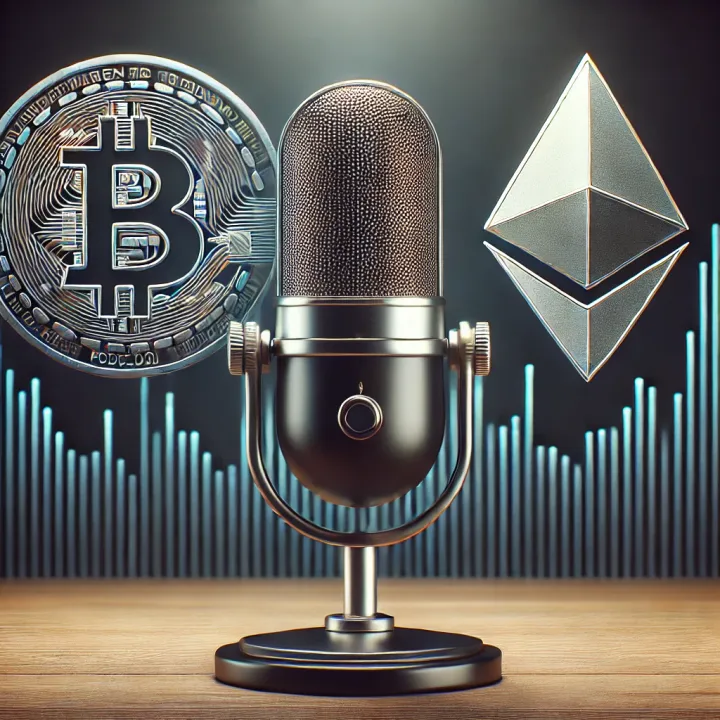Podcast: The Future of AI and Blockchain
... the truth is that AI and blockchain go together perfectly...

If you have any questions, comments, or suggestions - please contact StJohn Piano on Tela:
tela.app/id/stjohn_piano/7c51a6
Invest in Tela:
tela.network/invest
Join Tela Network and become a consultant:
telablog.com/how-to-use-tela-for-consulting
This article contains the script of Episode 5 of the Tela Network Podcast, which you can watch here:
Alternate link: Rumble
rumble.com/v4i7hle-the-future-of-ai-and-blockchain.html
Listen on Spotify:
https://podcasters.spotify.com/pod/show/tela-network-podcast/episodes/The-Future-of-AI-and-Blockchain-e2grofl
Podcast Script
Welcome to the Tela Network Podcast. My name is StJohn Piano, and I am a Blockchain Researcher at Tela Network.
The topic of this short episode is "The Future of AI and Blockchain".
If you would like to join Tela Network and become a consultant, there will be a link to a guide in the description below.
Introduction
I often see AI treated as a competitor technology to blockchain. Either someone is interested in AI or they're interested in blockchain, rarely both.
But the truth is that AI and blockchain go together perfectly.
AI Is Search
AI is search. That's all it is.
It's a more complicated version of search, certainly.
The underlying technology is very interesting, and is a genuine advance.
I think a better term is really "Augmented Intelligence", not "Artificial Intelligence". "Augmented" implies a combination of human and computer, which is the truth of the matter, whereas "Artificial" implies a replacement of the human by the computer, which is not true. What is actually occurring is an economic war between teams of humans and AIs against other teams of humans and AIs.
Anyway: Here is what is going on when you use an AI tool to generate an image.
A huge imageset has been gathered, processed, and categorised. By humans, by the way !
A user can then prompt the AI system to search the space of possible images around the existing imageset, and return the search result as an image.
If the user is happy with the result, and publishes it, then effectively a new image has been curated by a human and added to the imageset.
So the key aspect here is human curation. That's the thing that keeps the AI's results grounded in reality, or at least within the bounds of what humans find interesting or useful.
Without that curation feedback loop, an AI system spirals off into meaningless possibility space.
The same thing applies to text and to video and to whichever other digital artefacts we want to produce.

Blockchain Is Data
Let's talk about blockchain.
Blockchain is the most secure, resilient approach to synchronising data between many participants that we've ever had available. I think of it as triple-entry accounting - you double-check your accounts, and then everyone else also double-checks your accounts.
It therefore follows that in the future all major value transfers are going to eventually settle (finally confirm) on a blockchain. This is extremely obvious if you know anything about how value is currently transferred.
Of course, most people are only exposed to the shiny front-end interface of payment systems, sometimes called fintech. They don't see the grimy industrial gears in the back-end, which is called payment processing - why would they ?
So I'll give a quick example: International bank transfers can take 2 or more days to finally settle. Bitcoin settles payments in an hour. Other blockchains, for example Ethereum, can settle payments in minutes. This is a 300x speedup. This is an incredible civilizational advance, rather like going from the bicycle to the aircraft.
To go further: Blockchains contain the data that you can rely on.
In the future, all other data on the Internet will come to be mostly AI-generated. Computers can generate 1000x more data than humans can, so... they will.
A brief request: If you like this content, please share it with someone else who would also enjoy it. Personal referrals are the most effective way to help a channel to grow. You can also click the like button, or subscribe to receive new content.
Let's press on.
The AI source data problem
AI companies face a nasty problem with their source data. How can they be certain that the data that they're gathering was actually generated, or at least curated, by humans ?
Because if AI systems start to mostly consume data (and opinions about data) that are produced by other AIs, then it becomes very difficult to make sure that the AI continues to produce results that humans find useful. Actually, it's probably impossible. So then the economic value of the AI system just - disappears !
The Solution
AI companies should rely on data that comes from blockchains.
You can make this more efficient by timestamping the data on a blockchain, instead of storing it all on the blockchain itself.
To do this, you take a big pile of data, such as a blog, you arrange it into a Merkle tree, hash it, and and then make a single blockchain transaction that includes the hash. It's basically a stripped-down version of a private blockchain.
I built such a system myself many years ago, which is viewable as a blog at edgecase.net - the technique works perfectly well, it just hasn't been widely adopted.
Now, all that this does is make the data reliably permanent.
You still need a reputation system that tells you that someone is a human, and therefore that their ratings of data are meaningful.
Fortunately, the spread of crypto is causing lots of people to learn how to use wallets, which are essentially digital passports.
So all we need to do is build reputation systems that use wallets as proof of identity. It's not easy, but it is also a reasonably known problem.
The Future
So, I expect to see a reasonably happy marriage between the two technologies.
Blockchain will handle data.
AI will handle searching that data.
Human-AI Teams
Now, there is one important detail from earlier that I want to return to.
I said that what is actually occurring is an economic war between teams of humans and AIs against other teams of humans and AIs.
This is absolutely true.
I do not see any viable future, economically, socially, philosophically, or in any other way, for an individual all by himself. Liberal individualism is over, it's done, it's a dead letter, time to move on to something new.
Starting from today, either you're part of a team or you don't matter, and you get nothing.
The most effective form of a team today is a network.
In the future, I don't think that there will be individual rights. There will be network rights, which you access through your membership in a network. I expect that many people will belong to multiple networks.
So: I recommend that you join at least one network. This is now the minimum bar.
Let's take a commercial break. This episode was sponsored by BlackRock, which is trying really quite hard to reduce you all to abject serfdom, but feels like the message just isn't getting through for some reason, so they wanted us to let you know. Be advised.
Tela Network
I am a founding member of a new network: Tela Network.
We have three main objectives:
1. A new messaging app called Tela, where you never receive a message unless the sender has first paid you. This protects your time and attention from the Internet. We use blockchain for identity and currency.
In a future where AI-generated people can have long conversations with you, I view Tela as an absolute necessity, not a luxury. It's for anyone who wants to remain productive in a world that is under virtual siege by AI-powered spambots.
Version 1 of Tela is finished and operational. Version 2 is under development.
2. A consulting network that we're building around the messaging app. It's basically our network of professional business contacts, where we can consult each other, but in which everyone's time is respected and paid for.
3. We will build a Tela AI, that users can consult. It will be based on the messages within the app, and we'll pay dividends to all the consultants that supply the data that it uses internally.
As you can see, we are constructing a Human-AI team for the new environment. The 21st century will be very different from the 20th, and it requires a new way of operating.
If you would like to join our network, get in touch.
That's the end of this episode.
I hope you found this podcast interesting and insightful. Thank you for listening.
If you have any questions, comments, or suggestions, you can contact me on Tela. My contact link will be in the description below.
A brief reminder: If you have enjoyed this content, please do share it with someone else who would also like it. Thank you.
Let's wrap up with a Latin phrase: Acta non verba, which means "Deeds, not words".
Yours from my wanderings through the Library of Jorge Luis Borges,
I am StJohn Piano, of Tela Network, signing off.
Podcast Description
"... the truth is that AI and blockchain go together perfectly..."
This is Episode 5 of the Tela Network Podcast, hosted by StJohn Piano.
Contact StJohn Piano on Tela:
http://tela.app/id/stjohn_piano/e5e543
Read this content as an article:
https://telablog.com/podcast-the-future-of-ai-and-blockchain
Guide: How to use Tela for consulting:
https://telablog.com/how-to-use-tela-for-consulting
If you have any questions, comments, or suggestions - please contact StJohn Piano on Tela:
tela.app/id/stjohn_piano/7c51a6
Join Tela Network and become a consultant:
telablog.com/how-to-use-tela-for-consulting
Follow Tela Network on LinkedIn:
linkedin.com/company/tela-network
Follow Tela Network on Twitter:
twitter.com/tela_updates
Join the Tela Social channel on Telegram to get every new update:
t.me/tela_social
Follow Tela Network on Instagram:
instagram.com/tela_updates
Invest in Tela:
tela.network/invest


